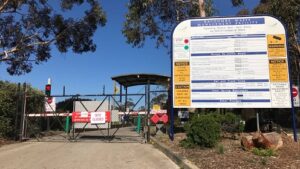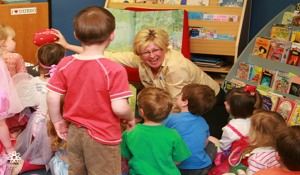
To subscribe to the fortnightly ALGA News, please click here.
-
The Western Australian Government has deferred the launch of its container deposit scheme due to Covid-19 concerns. The “Containers for Change” scheme was to have begun on June 2. Environment Minister Stephen Dawson said the postponement – in accordance with advice from the scheme’s coordinator, WA Return Recycle Renew – reflected the unprecedented impact of+
Posted 24 April, 2020 -
An unexpected victim of the Covid-19 pandemic, local media, has been crippled in both metro and country locations, with many mastheads suspending printing and standing down staff in the wake of collapsing advertising revenues as businesses cut non-essential expenditure or simply stop trading. The electronic media – free-to-air television and radio – is also under+
Posted 17 April, 2020 -

About 80 per cent of NSW’s 128 local councils have signed a workplace deal allowing workers stood down due to Covid-19 service closures to access a job retention allowance of $858.20 a week for up to three months. Under the Local Government (Covid-19) Splinter Award 2020, affected Local Government employees can supplement that allowance from+
Posted 17 April, 2020 -

A range of exemptions to local planning requirements have been announced under new state of emergency powers in Western Australia. Amendments to the Planning and Development (Local Planning Schemes) Regulations 2015 came into effect earlier this month, and give the Minister for Planning, Rita Saffioti, authority to temporarily override requirements and conditions set out in+
Posted 17 April, 2020 -
A review of developer contributions in NSW, headed by Productivity Commissioner Peter Achterstraat, has been announced by the Minister for Planning and Public Spaces, Rob Stokes. The performance of existing arrangements will be examined and recommendations made for reform based around transparency, efficiency, certainty, and fairness. Infrastructure contributions are made by developers to help deliver+
Posted 17 April, 2020 -
South Australia’s rural communities are ageing significantly faster than metropolitan Adelaide, with the Goolwa-Port Elliiot region having the oldest regional population profile in the state. Sixty-one per cent of its population is over the age of 50. COTA (Council on the Ageing) SA said while people living in rural communities feel a deep connection with+
Posted 17 April, 2020 -
Disaster assistance has been extended to a further 12 Local Government Areas in NSW affected by storms and flooding in February – including Blayney, Cabonne, Coonamble, Glen Innes Severn, Gilgandra, Mid-Western, Narromine, Oberon, Tenterfield, Upper Hunter, Walgett and Warrumbungle. Eighty-three LGAs in NSW, as well as Lord Howe Island, experienced significant losses and disruption due+
Posted 17 April, 2020 -
A Curtin University research project examining how Building Information Modelling (BIM) can be better integrated into Local Government Facility Management (FM) is looking for facilities managers to complete a short survey. Council buildings are the second-largest asset class managed by Local Governments nationally, and the survey is designed to explore and identify factors which can+
Posted 17 April, 2020 -
Scholarships worth between $1000 and $5000 are currently available to women working for local government to help support their participation in a range of online career building leadership development programs. The initiative is providing junior managers through to senior executive women with scholarships to support their growth and development via participation in one of three+
Posted 17 April, 2020 -
The first hearing of the Royal Commission into National Natural Disaster Arrangements was held this week. Commission chairman Mark Binskin told the online hearing “we do seek to point fingers or apportion blame to any jurisdiction, government or individual. Rather, we are focused on national coordination and on looking for lessons for the future”. The+
Posted 17 April, 2020 -
A special videoconference of the ALGA board today reflected on how Local Government is stepping up and reinventing itself to play a key role throughout the Covid-19 crisis and beyond, despite facility lockdowns, revenue losses, imminent rate relief impacts and external calls for more spending and higher debt servicing. Three main principals emerged from the+
Posted 9 April, 2020 -

Council-run childcare or early education centres ineligible for JobKeeper payments may be eligible for exceptional circumstances supplementary payments under the federal government’s Early Childhood Education and Care Relief package. The Exceptional Circumstance Supplementary Payment (supplementary payment) is available for providers/services who need a “top up” on the Early Childhood Education and Care Package payment (base+
Posted 9 April, 2020 -

The Department of Home Affairs will begin conducting online citizenship ceremonies in place of the traditional ceremonies that have been impacted by Covid-19 health and social distancing restrictions. Home Affairs began trialing ceremonies over secure video link at the end of March. When fully implemented, the online citizenship service will be able to confer citizenship+
Posted 9 April, 2020 -
NSW Rural Fire Service (FRS) commissioner Shane Fitzsimmons is quitting the role to lead a newly created state disaster agency. Announcing the creation of Resilience NSW this week, Premier Gladys Berejiklian said it would oversee the government’s disaster preparedness and recovery efforts – “be it Covid, be it cybersecurity, be it a whole range of+
Posted 9 April, 2020 -
Disaster assistance is now available to help Gascoyne and Pilbara communities recover from extensive flooding along the Western Australian coastline last month. Assistance is being provided through the jointly funded Commonwealth-State Disaster Recovery Funding Arrangements (DRFA). Natural Disaster and Emergency Management minister David Littleproud said said repairing key local roads would help communities recover quickly+
Posted 9 April, 2020 -
A new Department of Regional NSW has been established to coordinate support for communities, businesses and farmers affected by bushfires, floods and Covid-19. The department will bring together the divisions of Primary Industries, Local Land Services, Resources and Geoscience to form a central agency dedicated to regional issues. It will be headed by the Department+
Posted 9 April, 2020 -
The Sydney and Darwin city councils have announced packages to support local households, businesses and community groups during the Covid-19 epidemic. The $55 million City of Darwin response includes providing casual employment opportunities, waiving of permit charges, fees and levies to 30 June, deferral of business and household rates to 30 June, and rent relief+
Posted 9 April, 2020 -
The Tasmanian State Government will work with councils and the Tasmanian Planning Commission to ensure assessment and approvals processes are kept open and applications can continue to be processed during coronavirus restrictions. Planning Minister Roger Jaensch said modifying processes to allow planning, development and consultation to continue in the health emergency would mean the economy+
Posted 9 April, 2020 -
The NSW Government has announced funding of up to $82 million to be shared amongst 260 council-run childcare centres across the state. LGNSW President Linda Scott said that without the six-month rescue package, “we were looking at the closure of council-run childcare centres. The NSW government is also looking to cut red tape and fast-track+
Posted 9 April, 2020 -
The first tranche of Covid-19 fact sheets translated for people from a non-English speaking background have been published by the Department of Home Affairs. Available in 28 key languages spoken by Culturally and Linguistically Diverse (CALD) communities and settlement clients, the fact sheets contain consistent, up-to-date information relating to the novel coronavirus. The Commonwealth’s response+
Posted 3 April, 2020 -
The Federal Health Department is now accepting applications for grants from its business improvement fund for residential aged care. Small to medium-sized providers with limited access to other financial support (or facing significant financial pressures which may impact on care to residents or risk service closure) can apply for grant assistance to improve business operations,+
Posted 3 April, 2020 -
A federal parliamentary inquiry into homelessness in Australia has been suspended because of the present Covid-19 situation. Inquiry chairman Andrew Wallace MP said: “The committee does not wish to add to the stress on community groups, or divert their efforts from responding to Covid-19, by asking for submissions to the inquiry now”. Submissions already provided+
Posted 3 April, 2020 -
The first GP-led rural respiratory clinics to assess patients with mild-to-moderate COVID-19-like symptoms opened in Emerald, Queensland on 1 April. The federal government has committed to establishing up to 100 GP-led respiratory clinics around the country as part of it $2.4 billion COVID-19 health package. Regional Health, Regional Communications and Local Government Minister Mark Coulton+
Posted 3 April, 2020 -
The WA state government has allocated $100 million to waive a wide range of licence fees – including statutory planning fees – for small and medium‑sized businesses in COVID-19 impacted industries for the next 12 months. The measure is one of a number contained in a$1 billion COVID-19 economic and health relief package unveiled on+
Posted 3 April, 2020 -
With many communities and businesses having been heavily impacted by drought, bushfires and now the Covid-19 pandemic, the Australian Taxation Office (ATO) is highlighting the importance and value of local councils using Australian Business Register (ABR) data in their responses. ABR data can help in: identifying restricted and/or essential businesses that require support in your+
Posted 3 April, 2020 -
National COVID-19 hygiene practices for supermarkets have been published by the Federal Government’s Supermarket Taskforce. The practices cover social distancing measures, personal hygiene, use of personal protective equipment (PPE) in stores and cleaning practices, and devised by representatives from the retail sector and the Commonwealth Department of Health. The taskforce says it appreciates the important+
Posted 3 April, 2020 -
Roads Australia is calling on governments to recommit to long-term infrastructure provision amid concerns about the ability of its member organisations to deliver current workloads during the Covid-19 crisis. A survey of 166 RA member organisations delivering, operating and maintaining major transport infrastructure across the country found 35 per cent were experiencing staff availability issues.+
Posted 3 April, 2020 -
The deadline for council responses to requests by Deputy Prime Minister Michael McCormack for help in fast-tracking land transport infrastructure projects on local roads has been extended to Wednesday 8 April. Mr McCormack’s original request – designed to support local economies recover from the impact of Covid-19 – was sent to mayors and councilors on+
Posted 3 April, 2020 -
The first tranche of Best Practice Local Government Guides (Commonwealth Grant Agreement PT51916) have been made available to councils around Australia. The four guides comprise: Best Practice for Road Making Materials Best Practice for Unsealed Roads Best Practice for Sealed Roads; and Best Practice for Bridge Maintenance Australian Road Research Board chief executive officer Michael+
Posted 3 April, 2020 -
Local Governments across the nation are stepping up to the Covid-19 task, but the calls for rate relief, rates freezes, facility closures and plummeting parking and user charges revenue, combined with apparent lack of assistance from JobKeeper, Child Care packages or any other source is tough going for most councils. A string of extraordinary Covid-19+
Posted 3 April, 2020 -

The Tasmanian state government has extended the Local Government Loan Scheme from $50 million to $150 million to o ensure a steady supply of “screw-driver and paint-brush ready projects” during the Covid-19 crisis. The measure was one of several contained in a social and economic support package announced by Premier Peter Gutwein on 26 March.+
Posted 3 April, 2020 -

The target for the average recycled content in all packaging will increase from 30 per cent to 50 per cent under a new strategic framework launched this week setting out how Australia will achieve the 2025 National Packaging Targets. “Out Packaging Future” the report underpinning the new framework was launched by the Australian Packaging Covenant+
Posted 3 April, 2020 -
The Joint Standing Committee on Migration has decided to suspend its inquiry into migration in regional Australia, in light of the economic effects of the public health situation changing the nature of the needs of communities in regional Australia. “Given the fast evolving situation in Australia and around the world, and the challenges posed by+
Posted 27 March, 2020 -
The second stage of consultations with people with disability on a new National Disability Strategy for beyond 2020 were due to take place in the coming weeks. However, following the escalation of events surrounding the Australian response to COVID-19, the decision has been taken to defer the consultations. This decision reflects the advice of the+
Posted 27 March, 2020 -
It has been an extremely tough time for many Australians. Between the bushfires and floods, and now COVID-19, now is the most important time for us to look after those who are taking the hit the hardest. There were already 3.2 million Australians living in poverty before these crises and that number is sure to+
Posted 27 March, 2020 -
Farmers’ markets have been declared an essential service by the Federal Government as they are an integral link in the nation’s food chain. All market managers are doing everything possible to maximise public health safety at food markets on market morning. Shopping in the fresh air, at a safe distance, with your own basket or+
Posted 27 March, 2020 -
On Thursday 26 March the Prime Minister Scott Morrison announced the creation of a new National Covid-19 Coordination Commission. The Commission has been established to coordinate advice to the Australian Government on actions to anticipate and mitigate the economic and social effects of the global coronavirus pandemic. Designed to “better coordinate work between the private+
Posted 27 March, 2020 -
ALGA President David O’Loughlin participated in Transport and Infrastructure Council (TIC) meeting. Council comprises of Transport, Infrastructure and Planning Ministers from the Commonwealth, States and Territories, and the Australian Local Government Association. At the TIC meeting recent border control arrangements and the critical role the freight sector plays in providing essential food supplies of food+
Posted 27 March, 2020 -

ALGA is aware that councils are now developing their budget processes for 2020-21 and one of the issues which has arisen is the need for certainty around their Financial Assistance Grant allocations for 2020-21, especially in light of the Government’s announcement that the 2020-21 Budget will be delayed until October. The Government’s Financial Assistance Grants+
Posted 27 March, 2020 -

A number of Councils have announced support packages to assist residents, business, sporting and community groups address the social, cultural and economic impacts of the COVID-19 pandemic. Some measures taken by Gladstone Regional Council include rent concessions for Council-leased commercial facilities, freezing of interest on outstanding rates and charges and financial support for sporting and+
Posted 27 March, 2020 -

Closures, restrictions, working from home, rate relief, landing fees relief, service cuts, hardship policies, delivery curfews, public health inspections, and even delays to the Federal Budget and questions over FAGs funding – how quickly our world has changed. Yet our communities’ need for help has rarely been higher, nor has the lack of certainty. The+
Posted 27 March, 2020 -
Due to Covid-19 virus, the organisers of the 2020 National Road Safety Week have decided that it is in the best interests of the Australian community to postpone. As such, the Week is now scheduled for 9th – 15th November, with the national launch in Sydney proposed for Sunday 8th November 2020. Postponing the Week+
Posted 20 March, 2020 -
ALGA, the state and territory local governments and a large number of councils were involved in a consultation process earlier this year on the proposed ban on the export of waste paper, plastic, glass and tyres. Last week the Council of Australian Governments agreed to the phased introduction of the export ban. The ban on+
Posted 20 March, 2020 -
In a Federal Court ruling issued last week, Telstra has won a case which will allow it to continue rolling out its New Payphone Cabinets with 75 inch (190cm) digital advertising screens as “low impact facilities” which do not require council planning approval. Schedule 3 of the Telecommunications Act 1997 provides that if a structure+
Posted 20 March, 2020 -
The Coronavirus pandemic is presenting unprecedented challenges for all councils when considering issues around the continued operation of council facilities and services. This can include libraries, pools, leisure centres, service centres, halls and caravan parks Each council will need to make its own decisions in light of its unique circumstances, the community’s needs and the+
Posted 20 March, 2020 -
The ALGA Board expressed its support for councils doing everything they can to ensure supermarkets are restocked and rejected recent criticism of local governments as a key cause in problems restocking supermarket shelves. When approached by Coles and Woolworths for temporary exemptions to curfews most Councils have readily agreed. Some like the Knox City Council+
Posted 20 March, 2020 -

Unfortunately the 2020 National General Assembly (NGA) will not go ahead in June 2020. The ALGA Board has made this difficult decision in light of the Government’s decision to ban non-essential gatherings of more than 100 people at indoor venues as part of its efforts to slow the spread of coronavirus. The Prime Minister has+
Posted 20 March, 2020 -

On Wednesday 18th March, Prime Minister Scott Morrison announced restrictions being put in place to address the spread of coronavirus in Australia. He stressed this is not a two-week solution it is most likely to be six months. “Life is changing in Australia, as it is changing all around the world. Life is going to+
Posted 20 March, 2020 -

Droughts, bushfires and now a global virus – the need for strong and stable Local Government has never been greater for our communities. The Prime Minister’s recent announcements dramatically underline that Governments at all levels must step up to keep the nation healthy, our businesses solvent and people in jobs. Councils are the most connected+
Posted 20 March, 2020 -
Animals perceive light differently from humans and artificial light can disrupt critical behaviour and cause physiological changes in wildlife. Artificial light can stall the recovery of threatened species and interfere with a migratory species’ ability to undertake long distance migrations integral to its life cycle. To address this conservation challenge, the Commonwealth Department of Agriculture,+
Posted 13 March, 2020 -
Plastic Free July is a global movement that helps millions of people be part of the solution to plastic pollution – so we can have cleaner streets, oceans, and beautiful communities. What started out as a local government initiative in WA, the award-winning Plastic Free July behaviour change campaign is now one of the world’s+
Posted 13 March, 2020 -
The Commonwealth Department of Finance is reviewing the Lands Acquisition Act 1989 (LAA), which is the key legislation used by the Commonwealth to acquire and dispose of interests in land for public purposes. The LAA also regulates the disposal of Commonwealth land to local government and the acquisition of local government land by the Commonwealth.+
Posted 13 March, 2020


